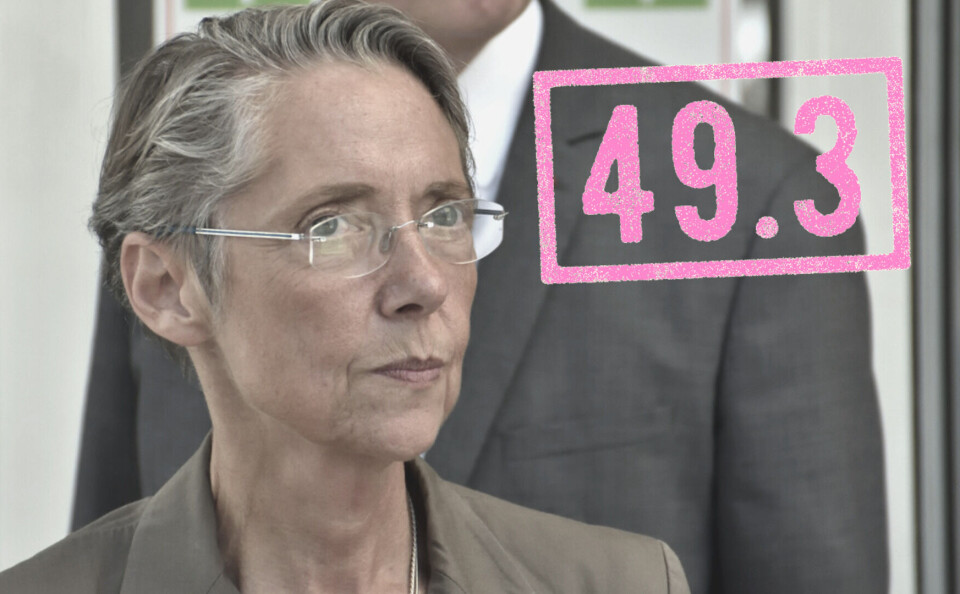-
France must do more to protect citizens detained in Iran, says former hostage
French-Irish citizen Bernard Phelan tells Théophile Larcher how 221 days in an Iranian prison have changed him irrevocably
-
Trump’s rhetoric feeds France’s long tradition of national decline
Columnist Nabila Ramdani offers a view on the American president's impact on French culture
-
France finally passes 2026 budget - what it means for residents
Budget has measures to help homeowners and low earners but is more punitive to business and local authorities
Explainer: what is France’s article 49.3 and why is it in the news?
The rule has been used more than 80 times since 1958 and there is a chance it could lead to the collapse of the Macron government

French Prime Minister Élisabeth Borne is expected to use a political mechanism known as article 49.3 this week to push through the government’s 2023 budget – a move that has been prompted by the ruling party’s lack of parliamentary majority.
President Emmanuel Macron’s Ensemble ! alliance claimed 245 seats in June’s legislative elections, short of the 289 needed to ensure that bills can be passed through the lower house of parliament, the Assemblée nationale, without backing from opposition parties.
Read more: ‘We must learn to govern differently’: Key points of Macron’s TV talk
This has led Ms Borne to consider using article 49.3 so that the budget bill can be passed.
Here, we explain what this involves and the associated risks.
Article 49.3 in a nutshell
The mechanism allows the French prime minister, following discussions with cabinet (Conseil des ministres) to unilaterally pass any bill concerning financial or social security issues.
With Mr Macron’s government losing its majority at the legislative elections, this constitutional tool has come into the mix.
This is especially the case as key members of France’s opposition parties have said that they will not approve the 2023 budget, called the projet de loi de finances pour 2023, which is being debated in parliament this week.
The budget contains a vast amount of different measures including on pension reforms, healthcare investment, public spending, the environment and the transition to a green economy, education, cigarette prices and migration.
Some of these policies, notably pension reforms and raising the retirement age, are highly controversial and are unlikely to get the backing of opposition parties.
Read more: Healthcare, climate, cigarettes: France announces its 2023 budget
Read more: Inflation, climate, pensions: a tough ‘rentrée’ for French government
‘Nuclear option’
Article 49.3 has often been described as using the ‘nuclear option’. This is because there is the possibility that it could cause the collapse of the government.
This can happen through a motion de censure (vote of no confidence) which must be signed by 58 MPs – ten percent of members – within 24 hours.
If there is no ‘vote of confidence’ around the bill that the government is trying to push through using article 49.3, then the text is directly adopted. If, on the other hand, the government fails to get an absolute majority – 289 votes – in any ‘vote of confidence’ then the prime minister and government must resign.
No government in the Fifth Republic has ever fallen due to a ‘vote of no confidence’ around article 49.3. Georges Pompidou’s government fell to a spontaneous vote of no confidence in 1962 but this was not due to the article.
Read more: Why is there talk of a vote of confidence for France’s new PM?
Limits on the use of article 49.3
Due to constitutional reform in 2008, article 49.3’s use has become limited. A government used to be able to use it as often as it wished but now that has been drastically limited to budgetary texts and one other text per session.
Claims that it muzzles democratic debate
Depending on what side of the political-power divide you are on, article 49.3 can be seen as a useful aid to push through legislation or a tool that muzzles democratic debate.
In 2006, former French president François Hollande denounced the article. He said: “Article 49.3 is brutality. 49.3 is a denial of democracy. 49.3 is a way of slowing down or preventing parliamentary debate.”
And then he went on to use it when he got into power.
Used 89 times since 1958
Michel Rocard is the prime minister who has used 49.3 the most under the Fifth Republic. He used it 28 times in three years, between 1988 and 1991, under the presidency of the socialist François Mitterrand.
The article has been used 89 times in total since 1958.
Since Emmanuel Macron came to power, the government has used 49.3 once when former prime minister Édouard Philippe attempted to pass pension reforms. However his attempt was scuppered by the Covid pandemic.
It looks likely his government will resort to the article again this week to push the budget through, with several MPs saying that it seems to be the only option. The decision to employ it could be made as early as tomorrow (October 12).
Related articles
Explainer: What is France’s Assemblée nationale and how does it work?
‘This is the calm before a stormy winter in French politics’
























